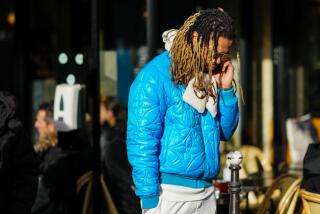Samuelson Has Learned to Deal With Insensitive Comments
To most fans, United States Olympic volleyball team member Bob Samuelson is a hero. But Samuelson, who is bald, knows what it is like to be razzed.
“Once we were playing in some Latin American country and the fans were chanting at me, ‘Bobbia, Bobbia!, ‘ “ Samuelson said. “I went to a Spanish-speaking guy on our team, Javier Gaspar, and asked him, ‘Why are they calling me little Bobby?’ He laughed and said, ‘No, they’re calling you Bombilla, which means light bulb.’
“I laughed and gave them a little wave.”
Five years ago, Samuelson’s hair started to fall out because of a condition called alopecia. Although hereditary alopecia, which includes male pattern baldness, is fairly common, alopecia areata is a disorder characterized by localized areas of hair loss in which the bald skin looks and feels normal. Alopecia universalis, which Samuelson has, is a rare, permanent form of alopecia areata that causes all the hair on the scalp and the body to be lost, including the eyelashes and eyebrows.
The cause is unknown.
“It was hard on me for three or four years, until my junior or senior year in college,” Samuelson said. “Now I don’t even notice. I’ll go out sometimes and a guy will be staring at me and I’ll think, ‘What the hell is he staring at?’ Then I’ll think, ‘Wait a minute. I’m 6-5 and bald.’ ”
Samuelson says the condition has helped teach him a lot about life. Namely, how to deal with something you can’t control and be proud of you who are. He has accepted the condition and has transformed from a shy person who refused to go out when the alopecia first started to a player U.S. coaches look to as a future team leader. When he is done playing with the National Team, he will either play in European leagues or the professional beach tour.
“Maybe I was meant to be different--I’d always considered myself different,” he said. “If anything, it might have helped me. It made me noticeable, which might have helped my volleyball career. It definitely helped my marketability--people know who I am right away.”
Although Samuelson has become a popular player in the United States, he often is razzed abroad. Once in 1989, Brazilian fans started throwing things at him, an experience Olympic Coach Frank Sturm credits with “preparing Bob for anything.”
Samuelson said the most difficult part of his condition is dealing with insensitive comments he receives in the United States.
“There are people who won’t say anything to your face, but they will say it loud enough for you to hear it,” he said. “People can be very rude. A guy will walk up to me and ask if I have cancer. No, but what if I did? What if I had cancer and only had a couple months to live? How would that make you feel?”
More to Read
Go beyond the scoreboard
Get the latest on L.A.'s teams in the daily Sports Report newsletter.
You may occasionally receive promotional content from the Los Angeles Times.






